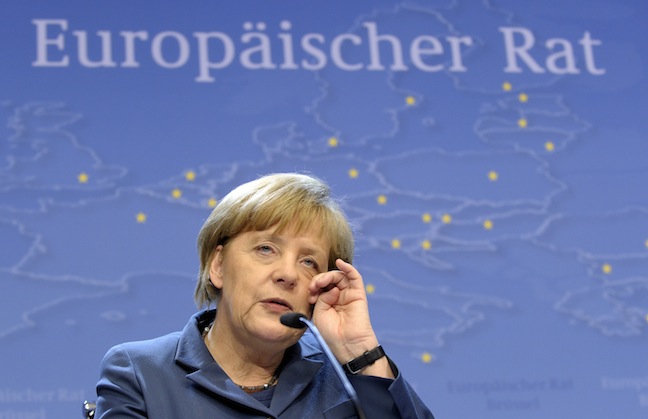The good news… — A famous comment attributed to Henry Kissinger, “Who am I supposed to call if I want to talk to Europe?”, at one time neatly summed up the weakness of European Union decision making. The EU had perhaps a heart – Brussels – but did not have a head. The good news is that the problem has been overcome. The bad news is that the person to call is German Chancellor Angela Merkel. The European Union’s President, Jean-Claude Juncker, is a mere placeholder.
It was not supposed to end that way. Many have now forgotten that one of the primarily motives for the foundation of the “Common Market” was precisely to calm Germany’s imperial urges – clearly expressed in two different world wars – and not to create a new vehicle for continental domination. The new reality is not really the fault of the Germans, but rather derives from the dramatically inept performance of the Union when it attempts to act as a “pan-national”, Europe-wide government.
The list of the disasters it has contributed to – always with the best of intentions – is a long one. In the foreign policy area alone we can put down the “Arab Springtime”, Greece of course, Ukraine and, still earlier, the Balkans and Kosovo. In terms of managing the economy, it’s worth noting that the only EU member state whose GDP has so far surpassed pre-crisis levels, the United Kingdom, not only refused to enter the euro zone but has systematically ignored the flood of heavy-handed economic “advice” coming from Brussels.
The Schengen Treaty removed border checkpoints between most EU states just in time to be spectacularly inappropriate to handle the immense (and widely foreseen) flood of unregistered immigrants from Africa and the Middle East. The case is symptomatic. The Union, having absorbed large areas of sovereignty from the individual European countries, is now able to assure that they cannot alone act effectively – but at the same time has shown itself to be incapable of taking successful action. The reaction in Brussels to its serial catastrophes is that typical of any failed politician: “They won’t let us govern. Give us even more extensive powers and we’ll fix everything!”
Given the many challenges the EU has failed to meet, this does not seem to be in the cards. What’s more, in light of the progressive failure of the French side of the Franco-German “understanding” which previously governed the Union – and given the real risk of a possible British exit – Germany has been left all alone at the top. Alone and, in the last analysis, weak. It’s own economy is not doing well. Then there is a problem of “mind set,” the excessively visible tendency to despise other countries the Germans find “less serious.” Add in that pesky “image difficulty” deriving from major wars too recently fought and still too well remembered.
Germany no longer even has a significant military apparatus of its own. On the East the country is protected by an historic enemy, Poland. To the West, the French General Staff jokes that it’s armored forces would take just three days to fight their way to Berlin, but only “because they’ve started to introduce speed limits on the Autobahn…”
Europe in this moment has only two ways out of the fix it finds itself in. One is to make the European Union less dysfunctional through a vast, if unlikely, reform – in effect, starting over again. The other path, perhaps a paradox, is to help Germany guide the EU more effectively. Strange to say, this second scenario might easily create space for a much stronger Italian role – if it felt like occupying it…
Warning: Anti-imperialist zone — North Korea and its eccentric leader Kim Jong-un have found another way to better cut themselves off from the rest of the World: on 15 August the country introduced its very own time zone. Since that date, “Pyongyang time” is Greenwich Mean Time plus 8.5 hours. Near neighbors South Korea and Japan are still setting their own clocks at GMT +9.












